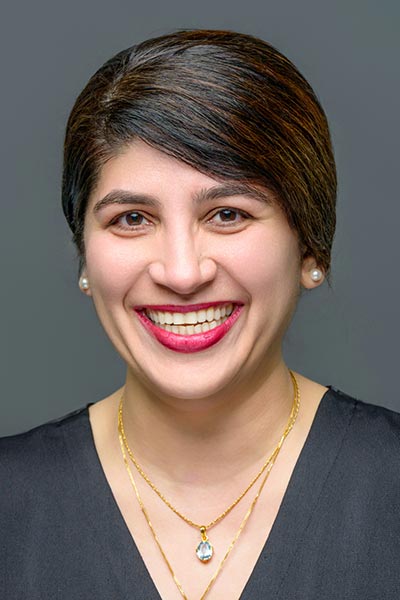The expanded Pediatrics Program at ACR Convergence 2024 will prioritize audience interaction and a variety of session formats to facilitate learning and development for caregivers in pediatrics.

“We’ve been steadily increasing our pediatric sessions year-to-year, which reflects the breadth and growth of the pediatric rheumatology community. In addition to abstracts in pediatric rheumatology, we have 21 pediatric sessions planned this year. Our goal is to bring together leading minds in pediatric rheumatology to foster learning and collaboration while sharing groundbreaking research,” said Susan Shenoi, MD, MS, Associate Professor, University of Washington, Seattle, and Chair of the Pediatric Team for the Annual Meeting Planning Committee (AMPC).
New this year is a pilot session called Engage and Solve: Pediatric Rheumatology Kahoot! Game on Monday, Nov. 18, at 2:15 p.m. ET in Room 201. The session will consist of multiple-choice or true/false questions in a Kahoot game format. Whether you’re a medical student, resident, healthcare professional/provider, or simply interested in pediatric rheumatologic conditions, this game offers an engaging opportunity to test your skills, learn new concepts, and connect with peers. To participate in the game, a cell phone or laptop is required.
“We are restricting this year’s pilot session to two topics: juvenile idiopathic arthritis (JIA) and rare diseases, or ‘zebras’ in pediatric rheumatology,” Dr. Shenoi explained. “We plan to solicit feedback after the session, and if the attendees think it’s valuable, we can bring the Kahoot game back for subsequent years.”
Another pediatric program session meant to spark discussion between session facilitators and audience members is Interactive Challenging Pediatric Lupus Cases: Antiphospholipid Syndrome and Lupus Nephritis, scheduled for Saturday, Nov. 16, at 3:30 p.m. in Room 201. The session will address two challenging cases of lupus nephritis and antiphospholipid syndrome. Two experienced clinicians will present these cases and review pertinent evidence that might inform care strategies. Subsequently, breakout groups will form to explore how they would manage and treat each case. Similarly structured is another session on Monday, at 1 p.m. in Room 201, called Infectious Mimics of Pediatric Rheumatic Disease in Children: An Interactive Discussion.
“Most educators are now finding that a flipped classroom or interactive setup encourages the learner to actively engage, thus promoting a deeper understanding of the topic discussed,” Dr. Shenoi said. “So, this year, there was a big push to incorporate these novel and interactive learning methods at ACR Convergence.”
At 10:30 a.m. on Sunday, Nov. 17, presenters in the Pediatrics Great Debate will deliberate on systemic juvenile idiopathic arthritis (sJIA) lung disease and treatment with biologic medications in Room 202AB. Biologic disease-modifying antirheumatic drugs (DMARDs) like anti-IL-1 and anti-IL-6 therapies have become foundational therapies for sJIA; however, there are now several reports of increasing incidence of highly fatal sJIA-associated lung disease. sJIA lung disease is an unclear and highly controversial topic currently in the pediatric rheumatology community. The debaters will examine the available data on the development of lung disease and debate the merits of continuing versus withholding biologic DMARDs targeting the IL-1 and IL-6 pathways for sJIA lung disease.
In addition to scientific knowledge, interpersonal considerations that affect patients’ experience with clinicians are vital for providers to consider. Also scheduled for Sunday, Cultural Humility for the Pediatric Rheumatologist will begin at 1 p.m. in Room 204ABC. Defined as the ongoing process of self-exploration and self-critique in combination with the willingness to learn from others while honoring their beliefs, customs, and values, cultural humility can help care teams assist pediatric patients of different ethnicities navigate challenges related to access or transition of care.
“A panel of patients and their families will share insights from experiences they have had throughout their journey with pediatric rheumatology around access to care, availability of resources, and how these factors can affect clinical outcomes in patients of varying ethnicities,” Dr. Shenoi explained.
Multiple pediatric program sessions will cover updated care topics, including Pediatric Rheumatology FDA Updates on Monday at 10:30 a.m. in Room 202AB and Updates on Assessment and Treatment of Juvenile Systemic Sclerosis on Tuesday, Nov. 19, at 9:30 a.m. in Room 143ABC.
“I look forward to an engaging and impactful ACR meeting that will drive learning, collaboration, and excellence in our field,” said Dr. Shenoi.
Additional Pediatric Sessions
Saturday, Nov. 16
- Toward Personalized Medicine in Pediatric Lupus, 9-10 a.m., Room 202AB
- Temporomandibular Joint Involvement – When Is It Inflammatory Arthritis?, 10:30-11:30 a.m., Room 204ABC
- SURF’n Autoinflammation – Evaluation and Management of Syndrome of Undifferentiated Recurrent Fever, 10:30-11:30 a.m., Room 202AB
- Pediatrics Year in Review, 1-2:30 p.m., Room 202AB
- Updates in Juvenile Dermatomyositis Assessments & Outcomes, 2:30-3:30 p.m., Room 204ABC
Sunday, Nov. 17
- Anti-MDA5 Juvenile Dermatomyositis: Clinical Presentation and Treatment, 9-10 a.m., Room 204ABC
- Genetic and Phenotypic Spectrum of SLE Across the Ages, 9-10 a.m., Room 202AB
- The Expanding Role of Ultrasonography in Pediatric Rheumatology, 2-3 p.m., Room 204ABC
- Pediatric Thieves Market: Show Me Your Best Cases!, 3:30-4:30 p.m., Room 202AB
Monday, Nov. 18
- Genetic Testing in the Era of Inborn Errors of Immunity: Who to Test and How to Interpret, 9-10 a.m., Room 202AB
- Single-Cell Omics in Pediatric Rheumatology: Translating Bench to Bedside, 10-11 a.m., Room 204ABC
- Pediatric ANCA-Associated Vasculitis, 1-2 p.m., Room 204ABC
- How You Do Depends on Where You Live: JIA Outcomes Across the World, 3-4:30 p.m., Room 202AB
Tuesday, Nov. 19
- Cerebral Crossroads: Primary Central Nervous System Angiitis in Children Explained, 8:15-9:15 a.m., Room 144ABC
Register Today for ACR Convergence 2025

If you haven’t registered for ACR Convergence 2025, register today to participate in this year’s premier rheumatology experience, October 24–29 in Chicago. All registered participants receive on-demand access to scientific sessions after the meeting through October 31, 2026.
